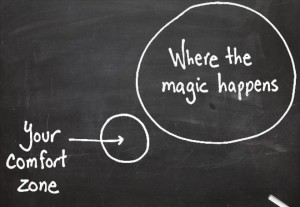I am an introvert by nature. I scratch my head sometimes in regards to how I travelled down the path of teacher, athletic coach, assistant principal, and principal. Can any of you relate out there?
I grew up as part of a rather large extended family (32 first cousins in addition to my own 3 siblings) and I was perfectly content to blend into the scene and just enjoy the energy around me during our many family gatherings. Socially, I was happy to just be part of a group and had no desire to be the center of attention (and still am). Athletically, I loved to compete, but had no desire to be have the spotlight pointing in my direction. When faced with public speaking it was only done on an as needed basis. Academically, I invited the chance to be faced with a tough problem and then hunker down and try to figure it out. Sit down with a good book alone or go out to a party and talk with lots of people? The former please. You get the idea.
Here’s the rub.
This profession has little room for introverts. Collaboration is key in education and if I keep my thoughts to myself then no one benefits. All of the great educational ideas in the world amount to nothing if they cannot be shared and effectively communicated with others.
As we all know, this profession really has little room for introverts. I am expected to a be a dynamic public communicator who can give speeches at the drop of a hat. I am expected to say the right things at the right times to keep students, teachers, parents, and the community motivated to passionately pursue our school’s mission and vision.
As I continue to scratch my head I have come to the realization that I was forced to be an extrovert in order to pursue the noble profession that is education. As so many others have done, I changed course from the potential for a far more lucrative paycheck and was drawn to become part of a select group of individuals who put others before self to serve the youth that will shape our future.
So what does a forced extrovert have to offer? Quite a bit it turns out.
Putting others first – We do not want the spotlight on us and continually look for opportunities to share it by celebrating and showcasing the accomplishments of others. Being selfless is the name of the game and servant leadership is second nature.
Being a great listener – As Steven Covey famously stated in his Seven Habits literature, “Seek first to understand, then to be understood.” Our natural tendency is to listen first and because of that we can learn a lot about the needs of others and how best to serve them.
Possessing a natural tendency towards student-centered learning – We do not want to be the sage on the stage – and best practice says that is a good thing. As a lead learner we find far more satisfaction and success being the meddler in the middle and/or the guide on the side.
Cherishing moments of reflection – The world of education is fast paced; reflection and analysis have to be intentional acts. We seek to slow down the pace, find moments of solitude, and take time to make the best decisions for those that we serve. This is not always possible, but it is certainly cherished and pursued.
Appreciating multiple learning paths and personalized education – We understand that a one-size-fits-all approach does not really fit all. We get that some students would prefer to demonstrate their learning in a way that does not draw attention, but can still showcase the gifts, talents, growth, and potential they possess.
Any other forced extroverts out there? I would love to hear how you have capitalized on your introverted tendencies as an educator to the benefit of those you serve.
Image retrieved from http://shannonmccrimmon.com/inspiration/stepping-out-of-your-comfort-zone/





Leave a Reply